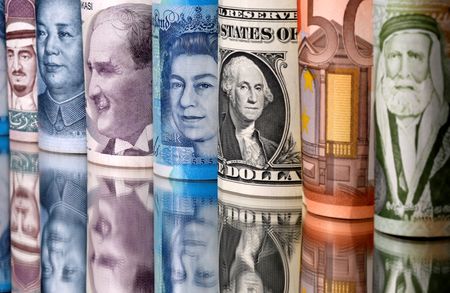 1
1 1
1

By Gertrude Chavez-Dreyfuss and Joice Alves
NEW YORK/LONDON (Reuters) – The dollar on Wednesday slid from one-week highs hit a day earlier, with U.S. Treasury yields retreating as well after hitting roughly two-year highs on 2-year and 10-year notes, but the greenback remains well-supported, as investors prepared for a widely expected interest rate increase in March.
U.S. 10-year Treasury yields touched a new two-year high of 1.902% on Wednesday, but was last down 1 basis point at 1.8539%.
But bond yields in other major economies rose as well, with the euro, sterling, the Canadian, Australian, and New Zealand dollars, among others, gaining versus the U.S. currency.
Sterling, meanwhile, edged higher after data showed British inflation rose 5.4% in December, to its highest level in 30 years, raising rate hike expectations. Talks of a leadership challenge to Prime Minister Boris Johnson kept the pound in check.
“Higher yields have gone global, spilling over and supporting currencies like the euro, sterling and Canadian dollar,” said Joe Manimbo, senior market analyst at Western Union Business Solutions in Washington.
“The buck remains on sturdier ground though ahead of next week’s Fed decision when the central bank could abruptly end QE (quantitative easing) and potentially ready the market for an aggressive rate hike in March,” he added.
The Fed will meet next week and will likely provide further clarity and details on the end of quantitative easing, which will likely be in March. The U.S. central bank could also signal it will raise interest rates in March as well right after ending QE.
Fed funds futures have fully priced in a rate hike in March and four in all for 2022.
In midmorning trading, the dollar index was down 0.1% at 95.574.
The greenback trimmed losses after data showed U.S. homebuilding unexpectedly increased in December amid unseasonably mild weather. Housing starts rose 1.4% to a seasonally adjusted annual rate of 1.702 million units last month.
The euro, the largest component in the dollar index, was up 0.1% at $1.1344, after the previous day’s sharpest daily drop in a month.
The single European currency was underpinned overall after Germany’s 10-year bond yield rose above 0% for the first time since 2019 on Wednesday, marking a potential turning point for euro area debt characterised for years by negative yields. [GVD/EUR]
The German 10-year yield, considered a benchmark for the whole euro zone, rose as high as 0.025%, and was last up nearly 2 basis points on the day.
Sterling rose 0.8% versus the dollar to $1.3837 after the red-hot UK inflation data. The euro, meanwhile, slipped 0.1% versus the pound to 83.17 pence, after earlier falling to its lowest since February 2020.
The pound was also supported by the surge in UK yields, with the two-year gilt yield rising to 0.958%, its highest level since March 2018.
The Australian dollar rose 0.6% to US$0.7233.
========================================================
Currency bid prices at 9:49AM (1449 GMT)
Description RIC Last U.S. Close Pct Change YTD Pct High Bid Low Bid
Previous Change
Session
Dollar index 95.5360 95.7140 -0.17% -0.133% +95.7920 +95.4970
Euro/Dollar $1.1346 $1.1327 +0.17% -0.20% +$1.1354 +$1.1319
Dollar/Yen 114.3450 114.5900 -0.20% -0.66% +114.7850 +114.2050
Euro/Yen 129.74 129.79 -0.04% -0.45% +129.9800 +129.4000
Dollar/Swiss 0.9160 0.9175 -0.17% +0.41% +0.9177 +0.9145
Sterling/Dollar $1.3642 $1.3598 +0.34% +0.89% +$1.3648 +$1.3588
Dollar/Canadian 1.2494 1.2513 -0.14% -1.17% +1.2524 +1.2450
Aussie/Dollar $0.7233 $0.7186 +0.67% -0.47% +$0.7238 +$0.7177
Euro/Swiss 1.0393 1.0391 +0.02% +0.23% +1.0403 +1.0375
Euro/Sterling 0.8315 0.8328 -0.16% -1.01% +0.8342 +0.8314
NZ $0.6805 $0.6765 +0.62% -0.55% +$0.6811 +$0.6764
Dollar/Dollar
Dollar/Norway 8.7470 8.8125 -0.51% -0.48% +8.8220 +8.7490
Euro/Norway 9.9267 9.9682 -0.42% -0.86% +9.9947 +9.9215
Dollar/Sweden 9.1111 9.1357 -0.10% +1.03% +9.1551 +9.1062
Euro/Sweden 10.3376 10.3476 -0.10% +1.01% +10.3686 +10.3334
(Reporting by Gertrude Chavez-Dreyfuss in New York and Joice Alves in London; Editing by Alexander Smith, Kevin Liffey and Jonathan Oatis)